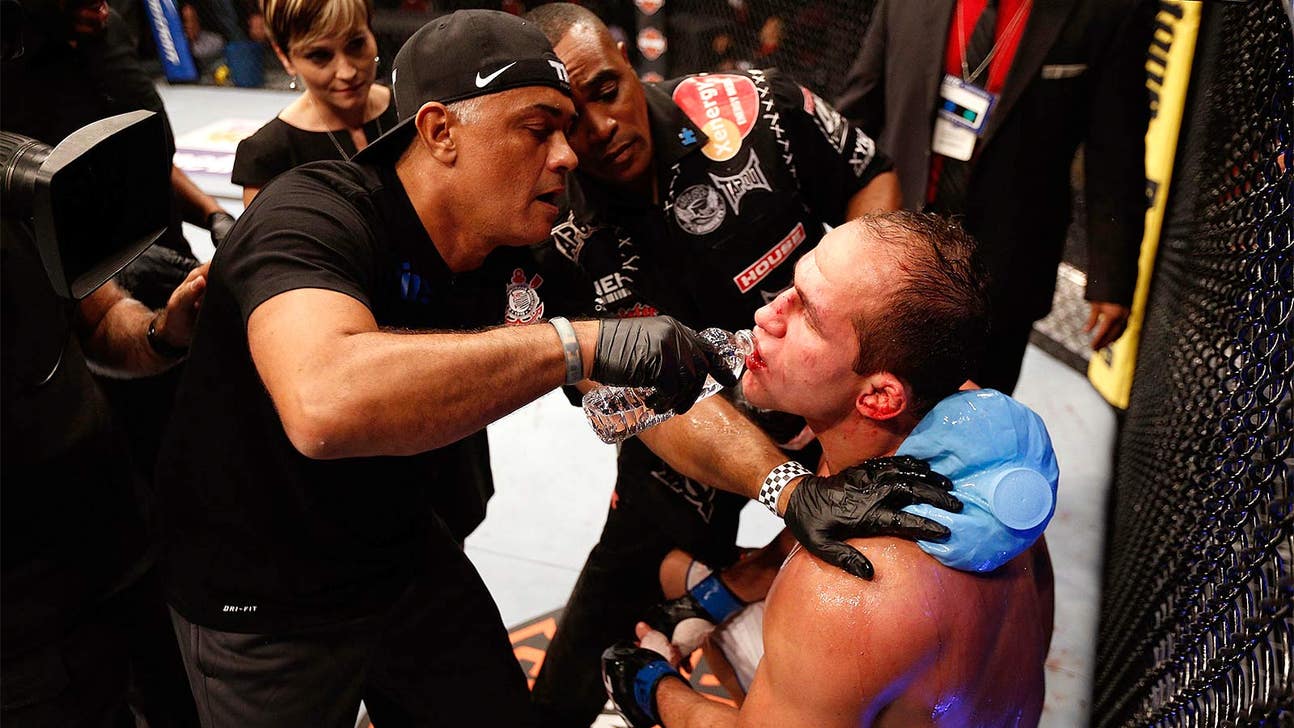
Corner's dilemma: To throw or not to throw in the towel

When the fight ended, Anthony Perosh was bloodied and beaten, but unbowed. Some consolation. His UFC Fight Night bout with Ryan Bader has been one of the most lopsided of 2013. For 15 minutes, Bader had teed off almost at will, landing 156 strikes, so many that he eventually broke his right hand against Perosh's head.
For many watching, it had been clear far before the 15 minutes were up that Bader was the better man that night, and that he would cruise to a win. By extension, Perosh was going to take more damage than necessary. That became obvious to the Brisbane, Australia fans, some of which called for referee John Sharp to halt the action. He never did. But the onus was not completely on him. If 2013 was the year of great fights in the UFC, it was also a year where we began to reexamine the idea of corners throwing in the towel.
Contrary to popular belief, throwing the towel into the cage to signify surrender is not illegal under the Unified Rules, yet it is rarely done. Though official numbers aren't kept, it's believed to have happened less than five times in the modern UFC era. More common is a corner stopping a fight between rounds. Perhaps it just seems more dignified to stop it when an athlete is sitting up, under his own power, than under an assault
Whatever your thoughts on the Diaz brothers, credit them for their progressive approach on the topic. It was Nick Diaz throwing in the towel for his brother back in April that jumpstarted all this talk, and it was Nate defending the decision that reminded us that it's acceptable to stop a beating that your fighter can't or the referee won't.
During the year, there were several fights that brought the topic back to the forefront. Aside from Bader-Perosh, there was Cain Velasquez vs. Junior dos Santos, Nate Diaz vs. Gray Maynard, and Jessica Andrade vs. Rosi Sexton, among others.
All of those fights made us cringe, yet the cornermen made the decision to let their fighters go on. In only one case -- the Diaz-Maynard fight -- did the loser suffer a knockout, but in every case, the dominated fighter was crushed to the end.
The possibility of snatching victory from defeat, however slim, still seems just too irresistible to ignore. Since it is a given that pain is a part of competition, it's not always easy to delineate how much is too much.
"I don't ever want to throw in the towel," UFC welterweight Matt Brown told FOX Sports. "I go in not expecting to walk out of the cage safely. I go in there with the expectation and belief that there's a possibility I could die here tonight. It doesn't happen much in MMA but there is that possibility. I believe 90 percent of fighters at my level are fairly willing to die in there. That is our life. If you take that away from us, we don't have anything. But it's a very difficult situation."
It's a difficult one partly due to the bonds formed sweating together in training camps. For many fighters, the gym becomes a second home. For the ones that relocate, it's home, period, and the people around them become family.
And while on one hand, while you never want to see family hurt, on the other, that's part of the job description. Watching them suffer pain is somehow easier than watching them surrender a dream -- and playing a role in the process. After all that time and all of the sacrifices made to prepare for that moment, the last thing a coach wants to do is be the one who makes the decision to end the chase of victory.
"During a fight, I've broken my hand before, I've broken my leg," flyweight champ Demetrious Johnson told FOX Sports. "I've told [trainer Matt Hume] and he goes, 'What do you want to do?' You're here to fight. You got two more rounds. If you want to quit, then quit. But I'm not going to quit for you.' My coaches do a good job protecting me, but it's my job to not put my coaches in a predicament where they have to think about stepping in to protect me."
It sounds crazy that a trainer is willing to send out a fighter with a broken limb, but when it comes to physical pain, that's a personal issue for the fighter to handle. Johnson, for example, went on to win both fights in which he broke bones. And when it comes to in-cage action, many trainers would rather put the onus on the referee to make the final call.
But with the emphasis on brain injuries in contact sports over the last two years, there is evidence that viewpoints could be changing when it comes to corners stopping fights with sustained head trauma. Aside from the Diazes, there was UFC president Dana White voicing an opinion that the dos Santos beating went on way too long.
"If I was taking that bad of a beating that they threw in the towel, it's probably for the best," UFC featherweight Matt Grice said. "I would respect what they decided because my corners know me so well. They know I have a never-quit attitude, but I wouldn't really have a problem with it."
Still, it doesn't happen for numerous reasons, including the fact that the infinite number of techniques available to MMA fighters make comebacks possible in seemingly one-sided fights.
"Look at Anderson Silva vs. Chael Sonnen," Brown said of the UFC 117 thriller. "What if they would have thrown in the towel in that fight? It was one-sided but this sport is so unpredictable and you can pull something out at any time. Look at Diego Sanchez-Gilbert Melendez. Melendez was completely dominating the whole time. Could you imagine if someone threw in the towel on that? It seemed like Sanchez barely had a chance to win but then he dropped him with a minute or two left, right? All of the sudden, he had an opportunity to win the fight."
It's true, that fights like those have become part of MMA canon, partly due to the ability to create a mini-miracle. If Frankie Edgar's boxing coach Mark Henry had his way, Maynard would have been the champion after his first-round barrage after UFC 125. Instead, the rest of the corner ignored his request to throw in the towel, and their fight series is something close to MMA's version of Gatti-Ward.
Edgar didn't know until later that he was fortunate to avoid a stoppage by the hands of both the referee and his own corner. Afterward, he went on to instruct them that he would never want one of his fights stopped, but that's a conversation that few fighters and corners ever actually have.
"It's kind of unspoken that they'll let me go on," women's bantamweight champ Ronda Rousey told FOX Sports. "We know we'll never get in that situation. They know they'll never have to [throw in the towel]. It's not going to ever have to be done and I would never want it to be done.The last fight, I would rather die in that cage than walk out a loser. So they know they're not doing it."
"The thing is, my corner trains with me day in and day out and they know how tough I am," added Grice. "They know what I can take and what I can't. So that's one of the reasons it's really important to have people that know you in your corner. That's their responsibility. Your goal is to win no matter what it takes. You're not in the right mentality to say 'I'm done.' There's no reason to have that conversation because I think it's definitely the corner's decision."
Though few fighters are willing to have that conversation about an uncomfortable topic, neither will they pass judgment on the idea of corners throwing in the towel. Maybe that's because most of them have cornered their teammates in fights at various levels of the sport, where there is not nearly as much at stake, providing little reason to continue for a battered fighter.
Johnson can remember one instance in which he was cornering a teammate, and when his charge came back to sit on the stool, he could not open his mouth. After a few seconds, they realized he had a broken jaw palate, and waived off the fight. Pros have fought through that kind of injury before, but Johnson didn't think it made any sense for an amateur to do the same.
When the stakes are highest, there is more potential upside to risking health. Remember, there is a win bonus at stake every time out that usually doubles a fighter's pay. That's a strong incentive; so is simple pride. So while we're not likely to see towels flying into the octagon with any regularity in 2014, at least the views on it seem to be changing. At least there is some dialogue. It's not a sign of cowardice or anything to be mocked. When it's the last recourse, it's a necessary one.
"I'm definitely not going to be critical of anyone's decision of whether they do or don't throw in the towel, but I'm sure any fighter that would have a conversation about that with a coach would say, 'Don't throw in the towel ever, or I'll f---ing kill you,'" Brown said. "I've never had that conversation. Maybe they have that conversation amongst themselves. I'd probably be real pissed if they threw in the towel for me. But I might look back a week later and thank them."

